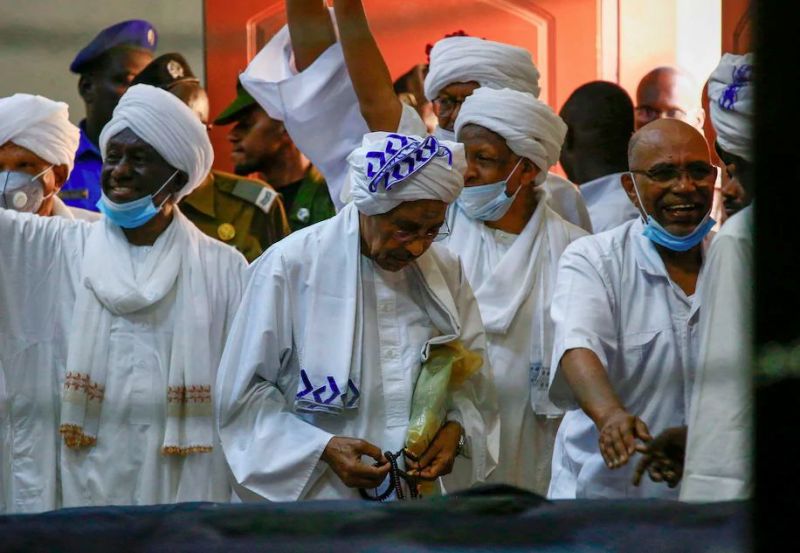
The U.S. government is poised to remove Sudan from the list of state sponsors of terrorism, based on an agreement that requires Khartoum to pay $335 million to American victims of terrorist attacks. The deal recognizes that Sudan has met the delisting requirement of a “fundamental change” in leadership following courageous work by the Sudanese people to overthrow a 30-year dictatorship. But this hard-won achievement may be squandered by Senate Minority Leader Charles E. Schumer (D-N.Y.) and Sen. Robert Menendez (D-N.J.), who oppose the deal in the mistaken belief that doing so will help secure justice for families of 9/11 victims.
Sudan became an international pariah under Islamist leader Omar Hassan al-Bashir. During his 30-year rule, the country committed genocide against its own people, using state resources to displace, rape and kill millions. It also hosted Osama bin Laden for five years following his 1991 expulsion from Saudi Arabia, which led the United States to designate Sudan a state sponsor of terrorism.
Last year, the Sudanese people finally managed to oust Bashir. I reported from Sudan as the transitional government went to work. Within months, the new leadership outlawed torture, ended the public flogging of women for perceived Islamic dress code violations, and advanced new laws to support press freedom and equal citizenship.
The speed of change was breathtaking, and a source of pride for the Sudanese. Those who lost family members in a violent crackdown during the regime’s final days told me how they were finally able to hold their heads high after years of being represented by a regime they despised.
But these changes do not help people feed their families. A broken economy is another legacy of Sudan’s dictatorship. Today, as its inflation rate soars to 170 percent, Sudan’s economic woes are compounded by the economic fallout of covid-19 and the impact of worst-in-a-century floods.
The country’s dire straits underline the significance of its government’s willingness to take out $335 million in loans to compensate American victims of terrorism. Having already agreed to pay $70 million to victims of al-Qaeda’s attack on the USS Cole in 2000, these funds will go to American victims of al-Qaeda’s 1998 bombings of the U.S. embassies in Kenya and Tanzania.
Compensation is long overdue. Victims of these attacks have spent two decades seeking justice through U.S. courts. When Sudanese officials refused to appear, the victims pursued default judgments, beginning to build a record linking Sudan’s support of bin Laden to al Qaeda’s attacks on the USS Cole and the embassies.
It is right to condition Sudan’s removal from the state sponsors of terrorism list on this compensation. Still, ordinary Sudanese find it incomprehensible that the United States did not delist their country immediately once they succeeded in overthrowing a terrorist-supporting dictator. They were heartened by news that Congress would soon pass legislation supporting Sudan’s delisting. But their hopes were dashed recently when 9/11 families opposed the deal. The families were upset that they were excluded from the compensation package, and worried the delisting would stop them from being able to sue Sudan.
Compensation for 9/11 is a sensitive issue. No one wants to be on the wrong side of the 9/11 families given all they have suffered. Last month, Menendez said he would oppose the Sudan legislation to “make sure 9/11 families are not stomped upon.” Yet this misunderstands what the legislation would do.
Sudan has never been central to the 9/11 litigation. Despite early default entries against Sudan, only litigation against Saudi Arabia and Iran has made significant progress, so there are currently no legal findings linking Sudan to 9/11. The 9/11 Commission, which came up with the most detailed investigation of the attacks to date, highlighted Saudi Arabia’s financial support of bin Laden.
It makes sense that 9/11 families have focused on Saudi Arabia. And thanks to their efforts, Congress passed the Justice Against Sponsors of Terrorism Act, which provided an exception to the rule that victims of terrorism could sue only countries that the U.S. government had listed as state sponsors of terrorism. Because of this, Sudan’s delisting would not prevent 9/11 families suing Sudan in U.S. courts, as Schumer and Menendez seem to fear; it would simply mean that they would need to sue Sudan under the same law they are successfully using against Saudi Arabia.
Schumer and Menendez are right to be vigilant on behalf of 9/11 families. But their concern is misguided when it comes to Sudan. If the deal goes through, 9/11 families can still sue Sudan. But if the deal fails, the small window of opportunity that American victims of the 1998 terrorist attacks have for getting compensation will be lost. And given the state of its economy, the no-deal scenario risks contributing to the demise of Sudan’s fledgling democracy. Such an outcome wouldn’t only be devastating for the Sudanese people. It would also be an enormous step backward for U.S. national security and the fight against terrorism.
Rebecca Hamilton is an associate professor at American University Washington College of Law.
